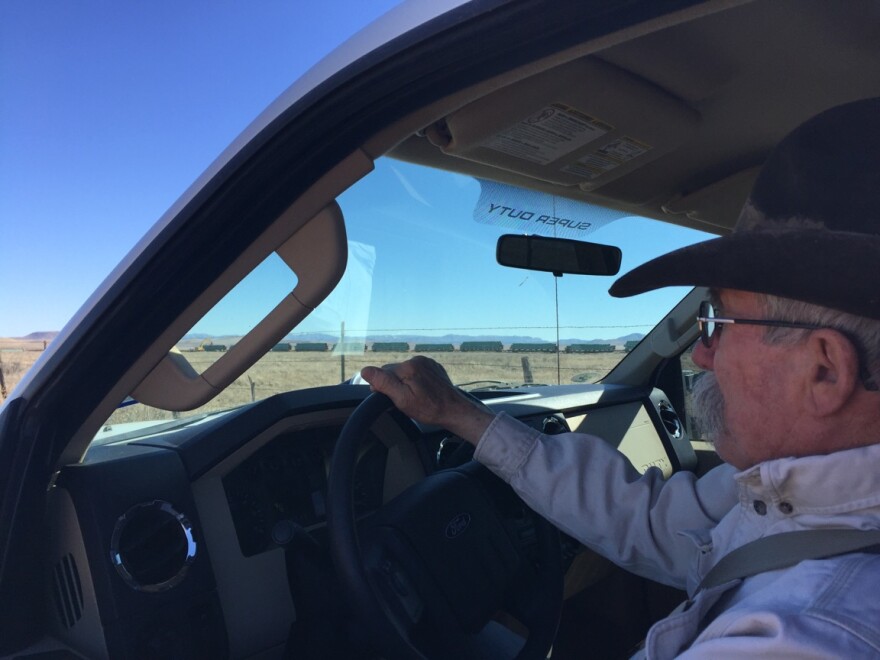For more than a year now, there’s been a lot of talk about the Trans-Pecos Pipeline in the Big Bend area.
We’ve heard from those who are strongly opposed to it and from those who say it would be a good thing for the region, namely, for the border city of Presidio.
This week, just as opponents were announcing their latest efforts to try to stop the planned natural gas pipeline from the Permian Basin to Mexico, the prospects for it being built became a little more real for people in the Big Bend, when the first shipments of pipe arrived by train near Alpine.
A train engine idled on the tracks just outside of the town Wednesday afternoon. More than 30 flatbed rail cars carrying green 42" pipe were being unloaded onto the ground - apparently a new staging site for the pipeline.
Rancher Joel Nelson owns land near where the pipe’s being unloaded. He's been an outspoken opponent of the pipeline, part of which will cut through his land.
Driving up a dusty road in his white pickup, rifle in the passenger seat, Nelson says he’s "highly dismayed" at the sight of the train and all that pipe.
"It seems now like it's definitely gonna happen, and I've had that feeling all along that it probably would," he says.
"There are still, I suppose, a couple of possibilities, but it's kinda beginning to look like it's something we're gonna have to accept."
Nelson says the pipeline would cross about three miles of his ranchland. He thinks that would have some effect his cattle operation, but that’s not why he’s been so loudly opposed to the plan.
"We can work around this," he says. "It's gonna have an impact, it's gonna cost us a lot of money, which may or may not be compensated for by what we get in easement compensation, but I'm not concerned about that."
He says he's concerned about the pipeline as a whole - all 140 miles of it - from the Permian Basin to the U.S.-Mexico border.
Big Bend country, he says, is different.
Beyond concerns about gas leaks, explosions, or environmental impacts, Nelson and other opponents have a broader fear that this pipeline could open up this region to more industrial activity.
"There will be spots between here and the Rio Grande river that might turn into something as ugly as the Permian Basin," Nelson says.
Whether that’s a well-founded fear isn’t clear. There’s other factors at play when considering the prospects for industry in the region - economics, geology, even the abilities of extraction technologies. So who knows? But that’s the fear.
Jason Murrell’s an avoid drone photographer who was out taking pictures of the pipeline shipments on Wednesday. His reason for not being a fan of the pipeline is pretty straightforward: he came here to avoid the presence of industry.
"I'm from Pasadena, I grew up there, my family moved out here when I was 15 years old, I'm familiar with that stink and what all it's gonna bring," he says. "That's actually why we moved out here."
The opposition movement’s been led by the Big Bend Conservation Alliance (BBCA). The group’s Executive Director Mattie Matthaei says they’ve pretty much realized there’s not a lot they can do to fight it on the state level, though they’re not ruling out a legal battle on that front.
So they're shifting their approach.
"Our efforts now are to make this a broader conversation on the state and national level," she says.
"Our feeling is that we're not alone in this, that this kind of activity of small communities being kind of overrun and having these large corporations just kind of running roughshod over everything in their path, all of those things are just not being taken into account."
The issue the group remains focused on is the way this pipeline’s regulated. Most of it’s 140 miles fall under state regulations, while a small part where it crosses the border is regulated by the feds.
Opponents say that’s not okay, and they even allege it’s a violation of federal law. They're continuing to call for the Federal Energy Regulatory Commission (FERC) to step in and regulate the entire pipeline, not just that border segment.
The commission’s indicated it will not do that and that it’s not violating any laws. But the BBCA’s still managed to flood regulators with hundreds of public comments supporting its position.
The group’s focus is widening even further. This week the BBCA joined other activist groups in a call for the Government Accountability Office (GAO) to launch a federal investigation of FERC for "bias towards the pipeline companies."
"Like hundreds of pipeline projects across the country, the Trans-Pecos Pipeline is flying under the radar because the FERC is allowing companies to bypass laws meant to protect the welfare of U.S. citizens and the environment," the group alleged in a statement.
The request is a tall order, and if there’s any hope of it actually happening, the Trans-Pecos Pipeline would have to make its way into national politics.
"We do our work at the request of Congress so any organizations seeking GAO reviews would need to work with their representatives," said Chuck Young, a GAO spokesperson.




